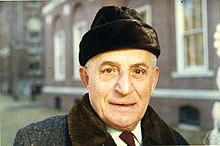Oscar Zariski
American mathematician (1899–1986)
Oscar Zariski (April 24, 1899 – July 4, 1986) was a Byelorussian-born American mathematician, famous for his foundational work in algebraic geometry and making Harvard University's mathematics department a leading center of research in algebraic geometry. At the International Congress of Mathematicians he was an invited speaker in 1928 in Bologna and a plenary speaker in 1950 in Cambridge, Massachusetts.

Quotes
edit- The well known classical treatise by Krazer on the theory of θ functions contains several beautiful chapters dealing with the applications of this theory to algebraic geometry (in the largest sense of the word), but on the whole this treatise is more analytic than geometric in character. In it, page after page, swarms of complicated formulas and relations follow each other, rarely illuminated by a geometric interpretation. One can say, without fear of exaggeration, that all the geometric applications of this theory to algebraic curves and varieties made since Riemann and Weierstrass (Hurwitz, Poincaré, Schottky, Wirtinger, etc.) are absent in Krazer's treatise, or at most are only mentioned in short historical notes.
- (1930). "Book Review: Algebraic Geometry and Theta Functions by Arthur B. Coble". Bulletin of the American Mathematical Society 36 (7): 452–454. ISSN 0002-9904. DOI:10.1090/S0002-9904-1930-04966-6.
- The idea of topologizing an algebraic variety V by choosing as closed sets the algebraic subvarieties of V can be used with good effect in order to topologize the set M* of all homomorphic mappings of any abstract field A into another abstract field K. In this general case we are dealing essentially with a generalization of the concept of the Riemann manifold of a field of algebraic functions ...
- (1944). "The compactness of the Riemann manifold of an abstract field of algebraic functions". Bulletin of the American Mathematical Society 50 (10): 683–691. ISSN 0002-9904. DOI:10.1090/S0002-9904-1944-08206-2. (quote from p. 686)
- The Italian geometers have erected, on somewhat shaky foundations, a stupendous edifice: the theory of algebraic surfaces. It is the main object of modern algebraic geometry to strengthen, preserve, and further embellish this edifice, while at the same time building up also the theory of algebraic varieties of higher dimension. The bitter complaint that Poincaré has directed, in his time, against the modern theory of functions of a real variable cannot be deservedly directed against modern algebraic geometry. We are not intent on proving that our fathers were wrong. On the contrary, our whole purpose is to prove that our fathers were right. ... In helping geometry, modern algebra is helping itself above all. We maintain that abstract algebraic geometry is one of the best things that happened to commutative algebra in a long time.
- "The fundamental ideas of abstract algebraic geometry." In Proc. Intern. Math. Congress, Cambridge, Mass. , vol. 2, pp. 77–89. 1950. (quote from pp. 88–89)